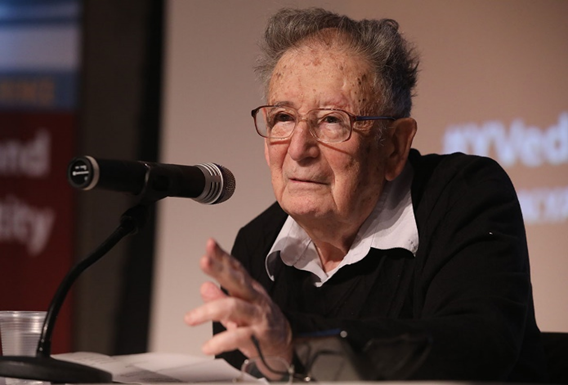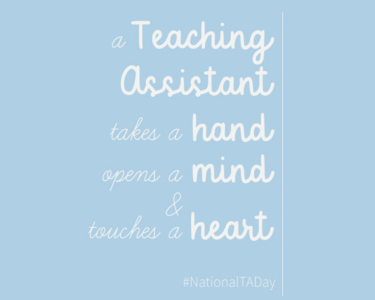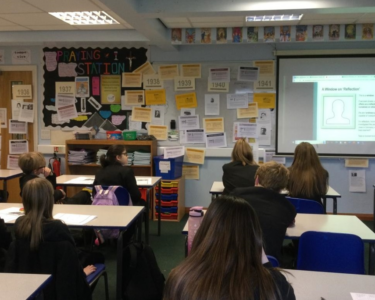We are proud to announce our 26th Quality Mark Beacon School: Highfields School. Our Quality Mark review process confirms the schools’ quality provision for and evolving specialism in Holocaust education. Holocaust teaching and learning is effective and contributing positively to policy, curriculum, pedagogy and practice. As a UCL Beacon School, Highfields School offers learning experiences that are research informed and result in outcomes that are empathetic and insightful, where students have been inspired and empowered by knowledge and understanding of the Holocaust. In partnership with UCL, Highfields has innovated and fast become an ambitious ‘Beacon’ committed to sharing best practice, refining and developing innovative approaches, and forward looking to their next steps.
Highfields School, is a 11-18, mixed gender, non-selective secondary school in Wolverhampton.
The UCL Centre for Holocaust Education extend heartfelt congratulations to Headteacher, Mr Graham Tate, and the whole school community on this prestigious achievement and take this opportunity to recognise the close cooperation with colleagues from across the school that enabled a wide impact on teaching practice in diverse spaces and with diverse pupils. It is abundantly clear the Beacon School programme has deepened and enriched quality provision for and experience of Holocaust education, but supported other areas of pedagogy and practice, ongoing school improvement, innovation and seeds of collaboration.
The Quality Mark identifies and celebrates many examples of best practice and innovation at Highfields School and recognises areas for ongoing development and internal reflection, but we highlight here, by way of summary, 8 key strengths and areas of best practice following a highly successful, positive and enjoyable review process:
- The School’s quality provision for and evolving specialism in Holocaust education is contributing to a curriculum that informs, engages, empowers, and inspires its learners, resulting in meaningful outcomes, both academic and in terms of personal development, character, safeguarding and civics.
- Highfield students – what student voice lacked in quantity of what learners said, they more than made up for in the quality of their respectful, knowledgeable, honest insights and reflections. Combined with how students engaged in the lessons observed, in written answers and also in having encountered Highfield learners, in person, as part of the #HtFMeUs project, Highfield students are genuinely interested in and enthused by teaching and learning about the Holocaust, their knowledge and understanding is sophisticated, nuanced and students can readily apply their learning to the modern world, their local context and global community. They are proud of their school, and this work, they are aware of what being a Beacon School means and take their role within that seriously, as ‘ambassadors and role models to others’, ‘upstanders’ and ‘caring active and informed citizens’. Highfields learners recognise and appreciate the skill, care, passion, and commitment of their teachers, and are curious and want to know more. There are strong relationships developed over time between students, teacher’s and support staff – teachers know their students well, every learner is unique and matters, and students feel ‘…Madam really wants us to be our very best’, ‘… they care about us, like really care about us and try to give us opportunities and experiences…’ There is a strong awareness from young people that their Holocaust education is ‘…very different’ to some of their friends outside Highfields. The school, teachers, parents and carers and the Highfields community should be incredibly proud of these young people and the hope for the future they represent.
- The intent and implementation of the History curriculum, and, increasingly, across a range of subject areas, especially Music, bares many of the hallmarks of deep thinking, planning, innovation and quality curriculum design. The Highfields 6 ensures consistency in teaching approach throughout the school, which respectful of disciplinary integrity, Both the Highfields 6 and 4Rs are evident in the approach to Holocaust teaching ad learning across the school and were effective in the lessons observed.
- The Beacon School Lead Teacher’s passion, commitment and dedication for the business of effective, quality provision for and experience of Holocaust T&L – it seems this opportunity was timely in a middle leader’s career, and within our cohort and alumni community she has found renewed purpose, both personally and professionally, passion and a sense of direction. Whilst proud of the success to date and ambitious for the future, the Lead Teacher is reflective and humble enough to look to ways to continue to grow and develop – a role model, respected colleague, a skilful and gifted classroom practitioner, history examiner and pedagogue and accomplished middle leader.
- Beacon School status is supported by Senior leaders and increasingly embedded within and seen as integral to the schools values, educational vision, and culture, but also recognised and shared across a growing Trust. Middle and Senior Leaders recognise the need for continued professional development to invest in staff and thereby further equip their community of practice to thrive, their capacity building to ensure work embeds, adapts, and flourishes over time. They are rightly proud of all that has been achieved to date, but acknowledge the Quality Mark is not a destination, but an ongoing journey.
- The scheme of learning is robust and engaging and respectful to its disciplinary intent. Its ‘How and why did the Holocaust happen?’ enquiry question demands a range of historical thinking, and affords opportunities to explore causation, continuity, significance and interpretation, but also speaks to the culture and values of the school – and the sense of shared educational vision that is rooted in the community and context is serves – that includes Holocaust education, both academic and holistic. The scheme weaves human stories and the lived-experience, such as Leon Greenman, throughout, and tackles several of the prevailing myths and misconceptions revealed by UCL 2016 research. It is also notable that the scheme and its underlying pedagogical principles have been significantly shaped by the Lead Teachers experience at the London Residential, and in particular the visit to the IWM London new Holocaust Galleries. This has led to an innovative approach to contextualising both WW2 and the Jewish experience and as the scheme evolves this will further embed and shape something quite unique to Highfields.
- Teaching and learning about the Holocaust is informed by research and embedded in UCL Centre pedagogic principles, and where possible the school embraces opportunities to outwardly engage – for example, working on ‘The Holocaust, Their Family, Me and Us’ project and the resulting DiverseCity initiative.
- Reflective and open professional dialogue. It was striking, without exception, that those colleagues engaged in the review process were deeply thinking about their curriculum, pedagogy and ambition for the best for their young people and the community they serve. Of the few areas which will be identified and developed within the EBI section of the full report – most were themselves put forward, discussed and considered by Highfields colleagues. This speaks to a school culture and professional community who know themselves well, are open, reflective and embracing of new ideas, not complacent and keen to develop. The authenticity, integrity and quality of the professional dialogues revealed much about all that has been achieved to date, but also colleagues curiosity, willingness to grow, develop and be challenged – the epitome of what the Quality Mark is about: identifying, celebrating and sharing best practice, but also refection and evaluation in a spirit of critical friend about possibilities, opportunities and areas to develop.
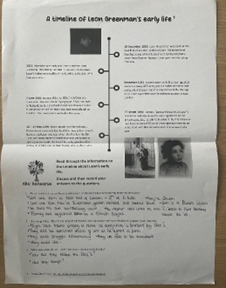
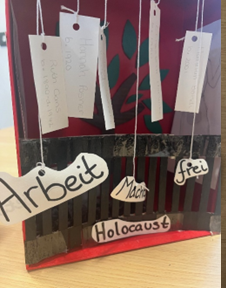
We would like to take this opportunity to acknowledge one uniquely distinctive feature of Highfield’s Quality Mark review process – the participation and engagement of Teaching Assistants. The Centre’s Nic Wetherall reflects:
“When Teaching Assistants are recognised and acknowledged in a school, you know there is a sense of #team culture and that young people at its heart that benefit from that combined care, support, and insight in lessons. At Highfields Teaching Assistants are valued and invested in – this review knows that for 3 reasons – 1. Students spoke about the support, in and out of lessons, by TAs, including in the context of Holocaust education. 2. That a Teaching Assistant was among those staff feeding into the review process and clearly valued and respected by colleagues and 3. That among such contributions and reflections was “…I have a wonderful TA, who not only keeps me smiling, but has been invaluable support to me over the years. She has played a central role in the #HtFMeUs project… she has assisted me with the running of the History Book Club, giving up her own time after school to support students… she has been part of the project since the beginning, supporting students with their research, ideas and discussions. She also spent many hours with me preparing the ‘thought-tree’ in receptions for HMD… She is a keen historian, despite this not being her chosen degree. She has supported me on school visits to Berlin and Krakow – she spent hours roaming the streets of Krakow with me as I planned and developed our walking tour… I cannot put into words how supportive and valuable she has been to me. She has even completed all the UCL online CPD sessions for her own interested and to better support students in school. She is marvellous. Her name is Jodie Ellis…” Again, that recognition and value says much about the schools culture and professional community and we take this opportunity to thank Jodie and her TA colleagues at Highfields for the invaluable contribution they each make, but also to Jodie for her thoughtful and relevant insights during the review process”.
In addition to these strengths and those which will be cited in the full report, we would like to take this opportunity to recognise Lead Teacher, Miss Jemma Tappenden contribution to the Centre’s work, beyond the Beacon programme, Helen McCord said:
“Jemma has been very generous in her support for our work and her support and insights have been invaluable for Centre colleagues. Drawing upon her expertise as both a BS lead teacher and as a lead examiner, she was able to advise us about the development of our Compromised Identities guidance materials for A Level history teachers and students. In addition, she worked alongside Centre colleagues to launch these materials at online CPD events for teachers, in partnership with the main examination boards. At these events she was able to draw upon her own experience of using these materials with her A’level students and she was able to draw upon her invaluable insights as a senior examiner. We are very grateful to Jemma for her support and for always being generous with her time and her expertise.”
Whilst Jemma has led and driven the schools’ Beacon work, in particular, the development of a scheme of learning, innovative collaboration with colleagues to ensure inclusive, quality and researched informed provision for and experience of Holocaust teaching and learning – the success of the programme and its impact upon student knowledge, understanding, experience and outcomes, is thanks to a dedicated team – whom she is rightly humbled by and proud of. As Lead Teacher, Miss Tappenden reflected:
“We are thrilled to have been awarded Quality Mark status in recognition of the hard work undertaken thus far and our commitment to ongoing development of outstanding Holocaust Education. The process was rigorous but deeply supportive; I really felt like Nic was championing the work we have done at Highfields, and supportive of the areas for development that we had identified in our own self-assessment process. The QM process enabled me to celebrate our successes with pride and left me feeling inspired and hopeful for the future. Our young people deserve the very best and our Beacon School journey has empowered us to embed pedagogical principles into Holocaust Education which will stay with our students for life. Achieving Quality Mark is a huge step forwards and signposts our commitment to our young people as well as a continued relationship with UCL.”
Colleagues buy-in from across the school, with Headteacher Mr Tate fulfilling the SLT link role, and senior Highfields colleagues such as Ms Stanley, always underpins successful and sustainable Beacon Schools. It was evident throughout the review that senior and middle leaders understood the potential rich benefits of integrated curriculum opportunities for Holocaust teaching and learning in supporting ongoing school development, and in opportunities to share best practice across a growing Trust, network of schools and partners. Headteacher, Mr Tate said:
“Becoming a UCL Quality Mark Beacon School is a genuine source of pride for all of us here at Highfields.
This is not only recognition of the tremendous work of our Lead Teacher Jemma Tappenden, Head of History, but for all of our staff and students who have really engaged with this very special project.
I would like to extend our thanks on their behalf to UCL for such a wonderful opportunity to enrich our curriculum and the lives of our students.
Education is so much more than achieving a fabulous set of exam results and qualifications to propel you onwards. As a school, we believe it is essential that we focus on the whole child and on creating enriching experiences for young people to listen, to empathise, to appreciate others, to think deeply and to express their views in a considered, thoughtful and respectful manner. Holocaust education does all of this and more.”
The Centre’s team commend all at Highfields School for their evolving innovative and engaging provision and practice in Holocaust education, their desire to embed research informed practice, commitment to ongoing professional development, pastoral care and safeguarding, civics and leadership – their commitment to ‘educating the ‘whole child’ by extending students’ learning beyond the classroom’ is lived, not laminated, ‘caught and taught’ – and they recognise Holocaust teaching and learning can and does contribute to their learners leaving Highfields able to make informed, safe, healthy, choices, take responsibility, make a positive contribution, appreciate and be successful.
Becoming a Beacon School at any time, is a significant undertaking at any time – to do so within a context of a tough and ongoing post-pandemic world, and a time of immense challenge and stress within the education system, and to pursue, successfully, is even more impressive and commendable. Successful accreditation is testimony to sustained hard work and innovation. Quality Mark Reviewer, Nic Wetherall remarked:
“Remembering, teaching, talking and learning about the Holocaust is uncomfortable. At Highfields School, it is understood that as individuals, professionals, students, and as a community we must, today and every day, build social courage to ensure “Never Again” and tackle all forms of hate and work towards a safer, more inclusive world and celebrate and embrace their DiverseCity. The schools successful Quality Mark process offers a timely reminder of what a school, a teacher, and a community can do. It was a privilege and absolute pleasure to see all that has been achieved to date, but also refreshing to hear reflective, ambitious, and innovative educators and reflective committed leaders consider next steps to ensure provision and practice continues to meet student and community evolving needs. Leaders recognise the importance of this work and are keen to continue the developmental journey in partnership with UCL – and we stand ready to walk alongside. Congratulations to all involved and special thanks to the students who represented Highfields so positively, and whose insights truly enriched the process, and thankyou to the incredible educator that is Jemma Tappenden – ‘the teacher we all wish we had’ – for her dedication, passion, integrity and ‘we will find a way’ attitude, that will surely see the EBIs reflected up and actioned short, medium or long term. I look forward to seeing where the Beacon journey takes Jemma and Highfields next!”
The full Highfields School 2024 report, featuring extensive details of their strengths and identification of suggested developmental action points, will be available soon.
The UCL Quality Mark scheme is a great way to celebrate and share best practice and is both developmental and forward looking. Beacon School alumni considering undertaking the Quality mark process should contact Nicola Wetherall or read more here.

